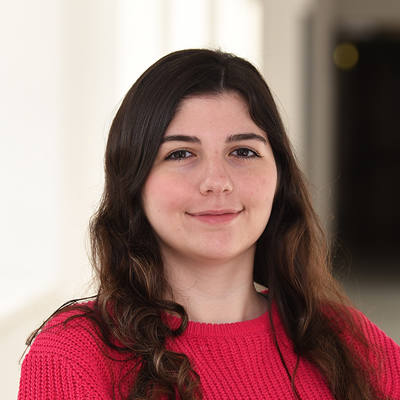
Jacqueline Marcia Boccacino
PhD Student
Career
Undergraduate studies
Jacqueline completed her undergraduate studies at the University of São Paulo (USP), Brazil, being awarded a B.Sc. degree in Molecular Sciences in August 2022. During her undergrad, she was a research student in the Laboratory of Neurobiology and Stem Cells of the Institute of Biomedical Sciences of USP, under the supervision of Dr. Marilene Hohmuth Lopes, between January 2020 and July 2022. Jacqueline’s undergraduate-level research focused on glioblastoma, the most aggressive form of malignant brain tumour. In particular, she investigated the role of cellular prion protein, the physiological isoform of the infectious prion, in the biology of that cancer through the analysis of publicly available bulk and single-cell RNA sequencing datasets generated from patient-derived samples. Jacqueline also had a side project which aimed to interrogate the importance of stress-inducible protein 1, a co-chaperone, in specific stages of early embryonic development by leveraging a publicly available single-cell RNA sequencing dataset that contained mouse cells ranging from the zygote to the late blastocyst stage. Check out Jacqueline’s flash talk in the Developmental and Paediatric Cell Atlas Meeting 2021 here.
Sanger Prize internship
Noteworthy, Jacqueline was the winner of the Sanger Prize 2021 and joined the Wellcome Sanger Institute for the first time as a visiting researcher in Dr. Sarah Teichmann’s lab in the Cellular Genetics Programme (CellGen), between April and July 2022. During her internship in the Teichmann Lab, she worked with Dr. Rik Lindeboom on the groundbreaking COVID-19 Human Challenge Study, which aimed to characterise the immune response against SARS-CoV-2 throughout the course of a COVID-19 infection. Jacqueline interrogated single-cell RNA (scRNA-seq) and V(D)J sequencing data obtained from nasopharyngeal and peripheral blood samples of individuals that had been exposed to the virus to look for potential SARS-CoV-2-specific T cell receptors. Check out the paper that reports the findings of the COVID-19 Human Challenge Study here.
Work experience
After the end of her Sanger Prize internship, Jacqueline went back to Brazil to spend some time with her family, and she then returned to Sanger in October 2022 to work as a bioinformatician in Dr. David Adams’ Experimental Cancer Genetics group, based in the Cancer, Ageing and Somatic Mutation Programme (CASM). During her time in the lab, she worked as part of DERMATLAS, an innovative project that aims to build a genomic atlas of a range of different skin tumour subtypes. Along with other team members and collaborators from the Parasites and Microbes Programme (PaM), she developed a pathogen identification pipeline for DERMATLAS. She also contributed to the quality control assessment of DERMATLAS cohorts and analysed bulk whole exome and RNA sequencing data of some of the skin tumours that are part of the project.
PhD at Sanger
After a very fulfilling journey working as a bioinformatician for a year, Jacqueline started pursuing a doctoral degree at Sanger and the University of Cambridge. Under the supervision of Dr. David Adams and Professor Muzlifah Haniffa, Jacqueline’s PhD focuses on dissecting the cellular and spatial landscape of skin cancers to understand how they develop and metastasise. In particular, she is using scRNA-seq and spatial transcriptomics to study cutaneous basal cell carcinoma and sebaceous gland carcinoma.
My timeline
PhD student, University of Cambridge & Wellcome Sanger Institute (October 2023 - present)
Bioinformatician, Experimental Cancer Genetics Group, Wellcome Sanger Institute (October 2022 - September 2023)
BSc in Molecular Sciences, University of São Paulo (USP), Brazil (August 2022)
Visiting researcher, Teichmann Lab, Wellcome Sanger Institute (April 2022 - July 2022)
Sanger Prize winner (May 2021)
Research student, Laboratory of Neurobiology and Stem Cells, University of São Paulo (USP), Brazil (January 2020 - July 2022)